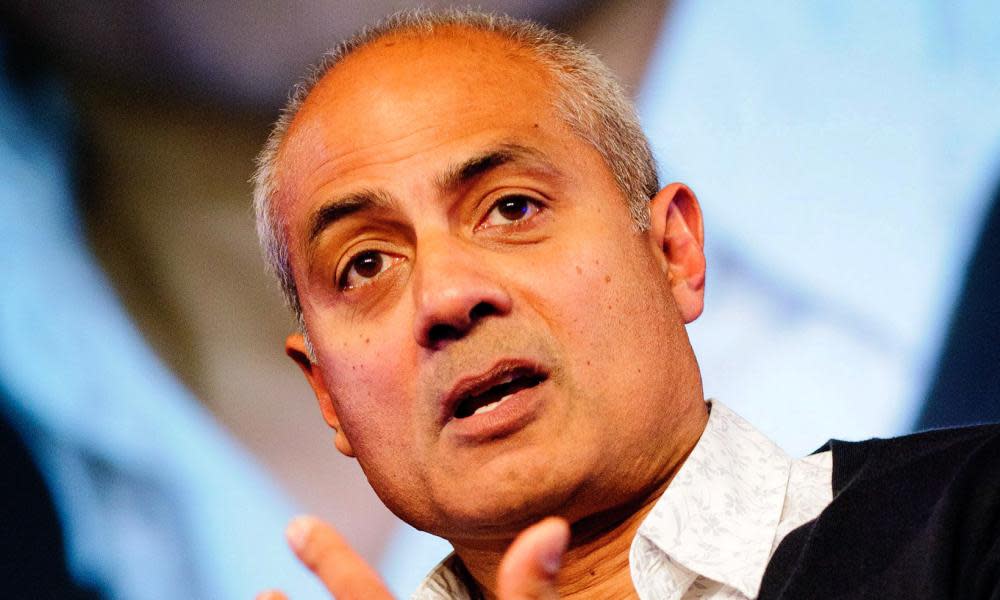BBC salary data shows huge pay gap between white and BME stars

The BBC’s best-paid star, Chris Evans, took home roughly the same as all of its BME high-earners put together last year, a Guardian analysis of salary data has shown.
Just 10 people on the list were from a minority ethnic background, and they tended to fall into the lower end of the earnings scale. The highest-ranked BME earner was newsreader George Alagiah, who was in 25th place.
The BBC published data on its employees’ pay in 14 pay bands: the lowest is £150,000-£199,000, while the highest is £2.2m-£2.249m.
The maximum that all BME staff together earned last year, using the upper limit of the BBC’s bands, was £2.24m, while the minimum Chris Evans could have earned was £2.2m.
All BME members on the list were in the lowest three pay grades, and seven were in the lowest band, earning less than £199,000.
Simon Woolley, director of the race equality organisation Operation Black Vote, said the figures showed a “deeply troubling” lack of diversity at the top of the BBC.
“The data published today clearly demonstrates how BME presenters and actors are viewed by the BBC: they are not part of the elite. These figures shine a spotlight on the poverty of BME representation in elite professions more generally.”
“We were also concerned that, while [BBC director] Tony Hall was contrite about the gender pay gap, he did not address this racial disparity.”
ITN news presenter Charlene White also highlighted the lack of diversity, writing on Twitter: “While headlines justifiably concentrate on gender pay gap, let’s not forget the other HUGE gaps in pay. Like, you know, ethnic minorities.”
Channel 4 News presenter Darshna Soni questioned whether enough attention was being paid to the diversity issue. She said on Twitter: “Lots of comment about BBC pay and the gender pay gap. Far less about the difference between what white stars and black/Asian stars are paid.”
Just a third on the list were women, and these also tended to fall at the lower end of the pay scale. There were no women in the top seven earners, while just two, Claudia Winkleman and Fiona Bruce, made it into the top 10.
No woman at the BBC earned more than £500,000 last year, and no women were represented in the top seven earning bands used in the salary data.
When grilled on Radio 4’s Today Programme by Mishal Husain, one of five BAME women to make the cut, Tony Hall said he was committed to closing the gender pay gap by 2020.
However, when challenged, he did not say whether the highest-paid men would be forced to take a cut to achieve this parity.
Women were under-represented in every category apart from scripted television, covering comedy and drama output, where they accounted for 57% of the highest-paid staff.
Unsurprisingly, most of the BBC’s highest earners are middle-aged; more than two-thirds of the BBC top earners are between 40 and 59 years old.
However, the women who made the list are significantly younger than their male counterparts: the average woman is 49 years old, while the average man is 55 years old.
The majority of the women on the list – 58% – are in their 40s, while exactly half of the men are in their 50s.
The BBC has faced a number of high-profile ageism rows in recent years, after former employees such as Miriam O’Reilly and Liz MacKean claimed they were discriminated against as older women.
The oldest woman on the list, radio presenter Moira Stuart, 67, is 10 years younger than the oldest man, actor David Jason, 77.
Seven other men on the list are older than Stuart – and five of them are more than 70 years old.
A statement from the BBC on the release of the statistics said: “On gender and diversity, the BBC is more diverse than the broadcasting industry and the civil service.
“We have set the most stretching targets in the industry for on-air diversity and we’ve made progress, but we recognise there is more to do and we are pushing further and faster than any other broadcaster.”

 Yahoo News
Yahoo News 
